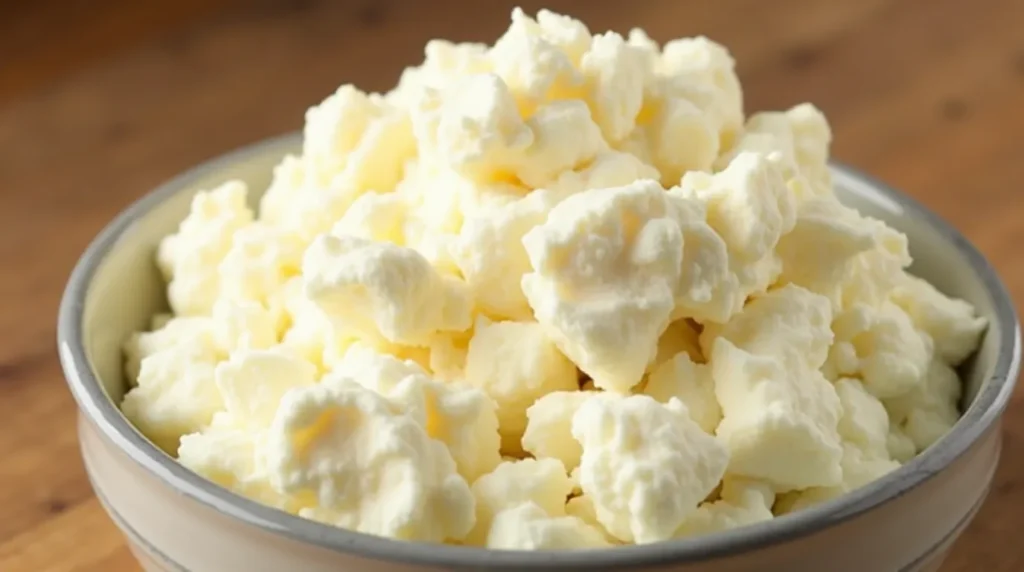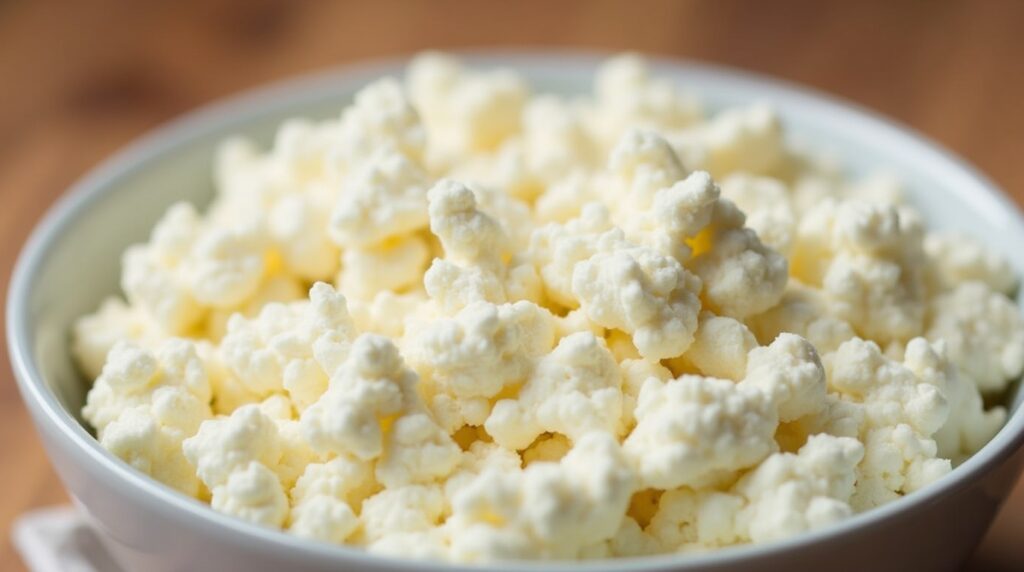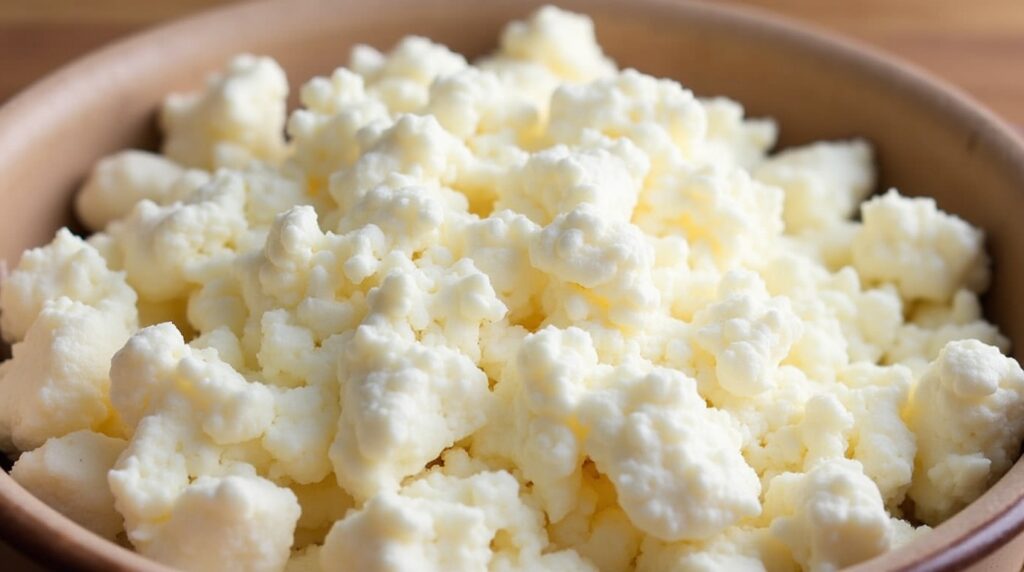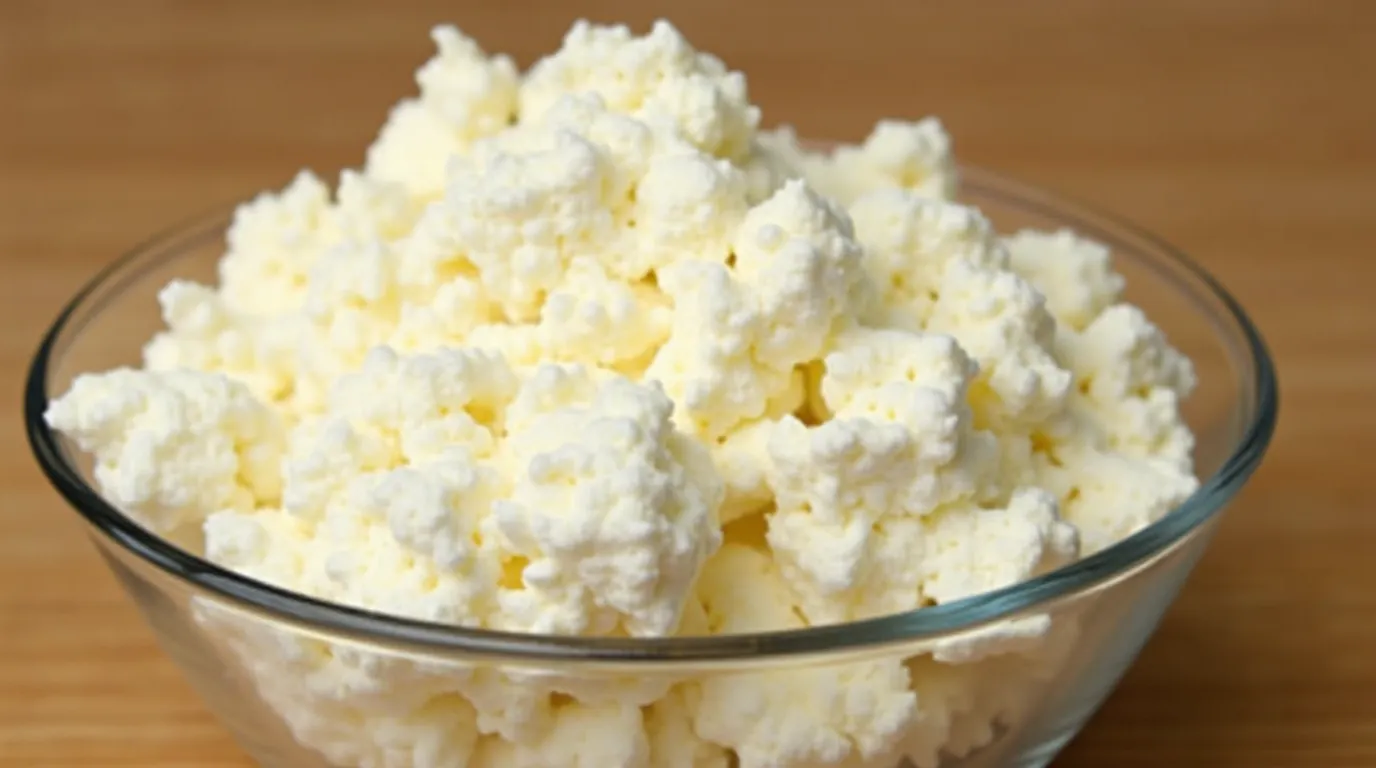When thinking about snacks, you might ask Is cottage cheese healthy? It has about 93 calories in half a cup and 12.4 grams of protein. This makes it appealing for a healthy snack.
Cottage cheese is also known for its creamy texture and mild taste. It’s a great addition to a balanced diet.
Looking at cottage cheese’s nutritional value is key. It’s packed with selenium, riboflavin, and vitamin B12. Its high protein and low calorie count make it ideal for weight management or improving health. In this article, we’ll dive into cottage cheese’s benefits and drawbacks as a snack. We’ll also look at its nutritional value and the advantages it offers.
What Makes Cottage Cheese Unique Among Dairy Products

Cottage cheese is special because of how it’s made and its role in American food. It has a unique texture and taste. A half-cup of low-fat cottage cheese has about 90 calories, making it great for those watching their diet.
The Production Process of Cottage Cheese
Making cottage cheese starts with adding acid to milk, which curdles it. Then, the whey is drained. This makes cottage cheese different from other cheeses. It also has a lot of protein, about 12 grams per half-cup.
Different Types of Cottage Cheese Available
There are many kinds of cottage cheese, like low-fat, non-fat, and full-fat. Here’s what makes them different:
- Low-fat cottage cheese: contains 1-2% milk fat
- Non-fat cottage cheese: contains less than 0.5% milk fat
- Full-fat cottage cheese: contains a minimum of 4% milk fat
Cultural Significance in American Cuisine
Cottage cheese has been a favorite in America for years. It’s loved for its many uses and health benefits. It’s a go-to snack, ingredient, or post-workout protein. Its rich history and cultural importance make it a beloved dairy product in the U.S.
The Complete Nutritional Profile of Cottage Cheese
Cottage cheese is packed with nutrients, making it great for weight management, muscle building, or a healthy diet. It has a lot of protein, is low in calories, and has a creamy texture.
A half-cup of low-fat cottage cheese has 81 calories, 14 grams of protein, and 1 gram of fat. It helps you feel full, which can lead to eating fewer calories and losing weight. Adding cottage cheese to meals and snacks is a smart choice because of its high protein and low calorie content.
Some of the key nutrients in cottage cheese include:
- Vitamin B12: 29% of the Daily Value (DV)
- Sodium: 20% of the DV
- Selenium: 19% of the DV
- Phosphorus: 13% of the DV
- Calcium: 5% of the DV
Cottage cheese is a valuable part of a healthy diet. It offers many benefits, like helping with weight management and muscle building. Adding cottage cheese to your meals can improve your nutrition and support your health goals.
Is Cottage Cheese Healthy? A Deep Dive into its Benefits

Cottage cheese is a nutritious food that offers many health benefits. It’s great for a healthy diet. It has a lot of protein, which helps build muscles and lose weight. This makes it popular among athletes and fitness lovers.
The protein in cottage cheese is good for weight loss. It helps build and repair muscles. Plus, you can make many tasty cottage cheese recipes, from sweet to savory.
Protein Content and Muscle Building Properties
Cottage cheese is packed with protein, about 12 grams per half-cup. It’s perfect for building and repairing muscles, after a workout.
Calcium and Bone Health Benefits
It’s also full of calcium, with a half-cup giving about 10% of your daily calcium needs. This supports strong bones, lowering the risk of osteoporosis and fractures.
Impact on Digestive Health
Cottage cheese has live cultures, including probiotics like Lactobacillus and B. bifidum. These probiotics keep your gut healthy, supporting digestion and boosting your immune system.
Cottage Cheese for Weight Management
Cottage cheese is great for managing weight because it’s high in protein and low in calories. One cup of low-fat cottage cheese has 28 grams of protein and only 163 calories. This makes it a good choice for those trying to lose weight.
The protein in cottage cheese helps you feel full. This can stop you from eating too much and supports weight loss.
Some benefits of cottage cheese for weight management include:
- High protein content to support satiety and weight loss
- Low calorie count to help with weight management
- Rich in calcium to support bone health
A 100-gram serving of low-fat cottage cheese provides:
| Nutrient | Amount |
|---|---|
| Calories | 84 |
| Protein | 11 grams |
| Fat | 2.3 grams |
| Calcium | 103 milligrams |
Adding cottage cheese to a weight loss diet can be helpful. It’s important to pick low-fat cottage cheese to keep calories and fat low. Cottage cheese’s creamy texture and mild taste make it a satisfying addition to a diet. It helps you feel full and supports weight loss efforts.
How to Include Cottage Cheese in Your Daily Diet

Adding cottage cheese to your meals and snacks is simple and tasty. You can try different recipes like cottage cheese pancakes or salads. It’s a great source of protein, making it a healthy snack option.
Starting your day with a cottage cheese bowl is a great idea. It’s packed with protein and nutrients. You can also mix cottage cheese with fruits and veggies for a nutritious snack. The protein in cottage cheese helps with weight loss by keeping you full.
Breakfast Ideas with Cottage Cheese
- Cottage cheese pancakes with fresh fruits and nuts
- Cottage cheese omelette with vegetables and whole wheat toast
- Cottage cheese smoothie with banana and honey
Savory Cottage Cheese Combinations
Cottage cheese is great in savory dishes like salads, soups, and stir-fries. Mix it with herbs and spices for a tasty dip. Its versatility makes it perfect for experimenting in the kitchen. You can find many cottage cheese recipes online to try.
| Recipe | Protein Content | Calories |
|---|---|---|
| Cottage Cheese Pancakes | 25 grams | 200 calories |
| Cottage Cheese Salad | 20 grams | 150 calories |
| Cottage Cheese Smoothie | 15 grams | 100 calories |
Potential Drawbacks and Considerations
Cottage cheese is a healthy choice, but it has some downsides. One big issue is its sodium content. This can be a problem for people with high blood pressure. The Dietary Guidelines for Americans suggest limiting sodium to 2,300 milligrams daily. Cottage cheese can have 400 to 500 milligrams per serving, which is a big part of the daily limit.
Another thing to think about is lactose intolerance. Cottage cheese has lactose, a milk sugar, which can be hard for some people. But, it has only about 2.5 grams of lactose per serving. There are also low-sodium and lactose-free versions of cottage cheese, making it a good option for those with dietary needs.
It’s important to look at both the good and bad sides of cottage cheese. It’s high in protein and has lots of nutrients. But, it’s also high in sodium and lactose. To decide if cottage cheese is right for you, think about your own health needs and any dietary restrictions you have.
| Nutrient | Amount per serving |
|---|---|
| Sodium | 400-500 milligrams |
| Lactose | 2.5 grams |
| Protein | 6 grams |
| Calcium | 80% of the recommended daily value |
Choosing the Best Cottage Cheese Products
When picking the best cottage cheese, look at its nutrition and any downsides. There are many choices, so reading labels is key. Look for low sodium and sugar. Low-fat cottage cheese is great for cutting calories and aiding in weight control.
For the best cottage cheese, aim for 250 calories or less, 360 milligrams or less of sodium, and 5 grams or less of added sugar per serving. Good Culture’s Cottage Cheese, Organic Valley’s Cottage Cheese, and Kalona’s Super Natural Organic Cottage Cheese are top picks. They’re not only nutritious but also taste and feel good.
| Product | Calories | Sodium | Added Sugar |
|---|---|---|---|
| Good Culture Double Cream Classic Cottage Cheese | 130 | 340mg | 0g |
| Organic Valley’s Cottage Cheese | 120 | 340mg | 0g |
| Kalona’s Super Natural Organic Cottage Cheese | 120 | 350mg | 0g |
Choosing the right cottage cheese lets you enjoy its protein, calcium, and probiotics. But, be sure to check the label for live cultures for better gut health.
Creative Cottage Cheese Bowl Ideas
Cottage cheese is a versatile ingredient for many bowl recipes. It’s high in protein and has many health benefits. This makes it a great choice for a healthy diet.
You can make a tasty cottage cheese bowl in just a few minutes. Try mixing cottage cheese with berries and honey for a sweet treat. Or, combine it with avocado and spices for a savory dish.
For a post-workout snack, mix cottage cheese with fruit and nuts. The protein in cottage cheese is perfect for fitness lovers and health enthusiasts.
| Cottage Cheese Bowl Recipe | Ingredients | Prep Time |
|---|---|---|
| Sweet Blended Cottage Cheese Bowl | 1 cup cottage cheese, 1 teaspoon honey, ½ cup fruit, ¼ cup granola | 5 minutes |
| Savory Blended Cottage Cheese Bowl | 1 cup cottage cheese, 1 teaspoon dried chives, ¼ teaspoon garlic powder, diced cucumbers, red peppers, and cherry tomatoes | 10 minutes |
These cottage cheese recipes are not only tasty but also nutritious. They’re perfect for a healthy lifestyle. With cottage cheese’s benefits and endless bowl recipe ideas, it’s time to get creative and make your own cottage cheese bowls.
Conclusion: Making Cottage Cheese Part of Your Healthy Lifestyle
Cottage cheese is a great addition to a healthy lifestyle. It’s packed with protein, has low calories, and lots of nutrients. It helps with weight control, building muscle, and overall health. But, remember to watch out for sodium content and lactose intolerance.
Choosing low-sodium and lactose-free cottage cheese is key. It fits well in many meals, from breakfast to desserts. It’s a great way to add protein to your diet.
Looking to lose weight, build muscle, or stay healthy? Cottage cheese can help. It’s a versatile food that can make your meals better and support your health goals.
FAQ
Is cottage cheese a healthy snack option?
Yes, cottage cheese is a great snack. It’s full of vitamins and minerals. It also has a lot of protein, is low in calories, and has a creamy texture.
What makes cottage cheese unique among dairy products?
Cottage cheese is special because of how it’s made. Acid is added to milk, causing it to curdle. Then, the whey is drained. This makes it creamy and flavorful.
It’s also big in American food culture. You can find it in many types, like low-fat and non-fat.
What is the nutritional profile of cottage cheese?
Cottage cheese is packed with nutrients. It has calcium, phosphorus, and selenium. It’s also high in protein and low in calories.
This makes it perfect for weight management, muscle building, or a healthy diet.
What are the health benefits of cottage cheese?
Cottage cheese has many health benefits. Its protein helps build muscle and aids in weight loss. It’s also good for bones because of its calcium.
Plus, it has probiotics that keep your gut healthy.
Can cottage cheese aid in weight management?
Yes, cottage cheese can help with weight management. It’s high in protein and low in calories. This can help you feel full and support weight loss.
How can I incorporate cottage cheese into my daily diet?
There are many ways to add cottage cheese to your diet. Try cottage cheese pancakes for breakfast. Or mix it with avocado for a savory snack.
You can also make smoothies or desserts with it.
What are the potentially drawbacks of cottage cheese?
Cottage cheese might have high sodium, which is bad for blood pressure. It also has lactose, which can upset some people’s stomachs. But, there are low-sodium and lactose-free options.
How do I choose the best cottage cheese products?
Look for cottage cheese with low sodium and no added sugars. Choose low-fat or non-fat options to cut calories and help with weight management.
What are some creative cottage cheese bowl ideas?
There are endless ideas for cottage cheese bowls. Try it with berries for a sweet treat. Or mix it with avocado for a savory snack.
For a post-workout boost, add protein to your bowl. It helps with energy and muscle recovery.

